HANOI TRAVEL GUIDE: Budget Itinerary, Things to Do


Here’s our DIY HANOI TRAVEL guide with recommendations on things to do, places to visit, hotels to stay in, and a sample DIY HANOI ITINERARY. We also included a breakdown of expenses so you can properly budget for this trip.
Hanoi and I met under terrible circumstances.
I arrived in Hanoi’s Old Quarter late at night after a grueling 2f7-hour journey aboard what many backpackers call the bus from hell. Thank heavens I was traveling with Jo, a French woman I met in Thailand, who became my travel buddy for the rest of my backpacking tour across Southeast Asia. I was completely drained, desperately famished, and helplessly disoriented. But at least I wasn’t drained, famished, and disoriented alone. LOL.
We didn’t even have any hotel booking, so we hopped from one building to another with 25-ish kilos on our backs, hoping for vacancy. Maybe it was the exhaustion, maybe it was the city’s restless spirit, maybe both, but the whole ordeal was dizzying for me. I had been in the city for minutes but it seemed to be assaulting my senses relentlessly. Countless motorcycles breezed through the streets in a blur like it was nobody else’s business. Honking seemed to be a national sport. And curbside eateries filled the air with irresistible aroma that intensified my hunger. Hanoi, to a first-timer, can be daunting.
The next day, with renewed energy, I saw the Vietnamese capital differently. That’s the thing about Hanoi; it’s multi-dimensional. It scares you with scooter madness one minute, then you’re having the most relaxing stroll by the lake the next. You’re scammed in the morning, then you’re enjoying the most delicious cheap bowl of pho in the afternoon. Its charm doesn’t strike; it creeps in, albeit very, very slowly.
Hanoi: Essential Travel Information
Hanoi is the capital of Vietnam. Home to almost 8 million residents, it is the country’s second largest city by population and has the second busiest airport. (Ho Chi Minh City is bigger in both counts.) Hanoi’s location in the north and rich transportation network make it an ideal first stop on a multi-city journey across Vietnam or even Southeast Asia. It is a usual jump off point to rustic destinations like Ha Long Bay, Ninh Binh, Mai Chau, and Sa Pa.
Hanoi’s history is written all over the city. For 800 years since 1010, it was the political center of Vietnam. But in 1873, the French conquered the city. In 1902, it was made the capital of French Indochina, made up of Vietnam, Cambodia, and Laos, which were all French colonial territories. You’ll see the French influence even to this day. A short walk across will show the city strongly embracing traditional Vietnamese heritage, but the French imprints are undeniable. The Japanese took over the city for five years. In 1945, revolutionary leader Hồ Chí Minh proclaimed independence from French Indochina and established the Democratic Republic of Vietnam, more commonly known as North Vietnam, with Hanoi soon declared as the capital. For over 20 years, North Vietnam was a separate state from the south, until they defeated the South in the Vietnam War in 1975. Hanoi became the capital of the reunified Vietnam in 1976.
Today, Hanoi is one of the most rapidly developing cities not just in the Southeast Asian region but in the world, as evident in its infrastructure, industrial production, trade, and overall GDP.
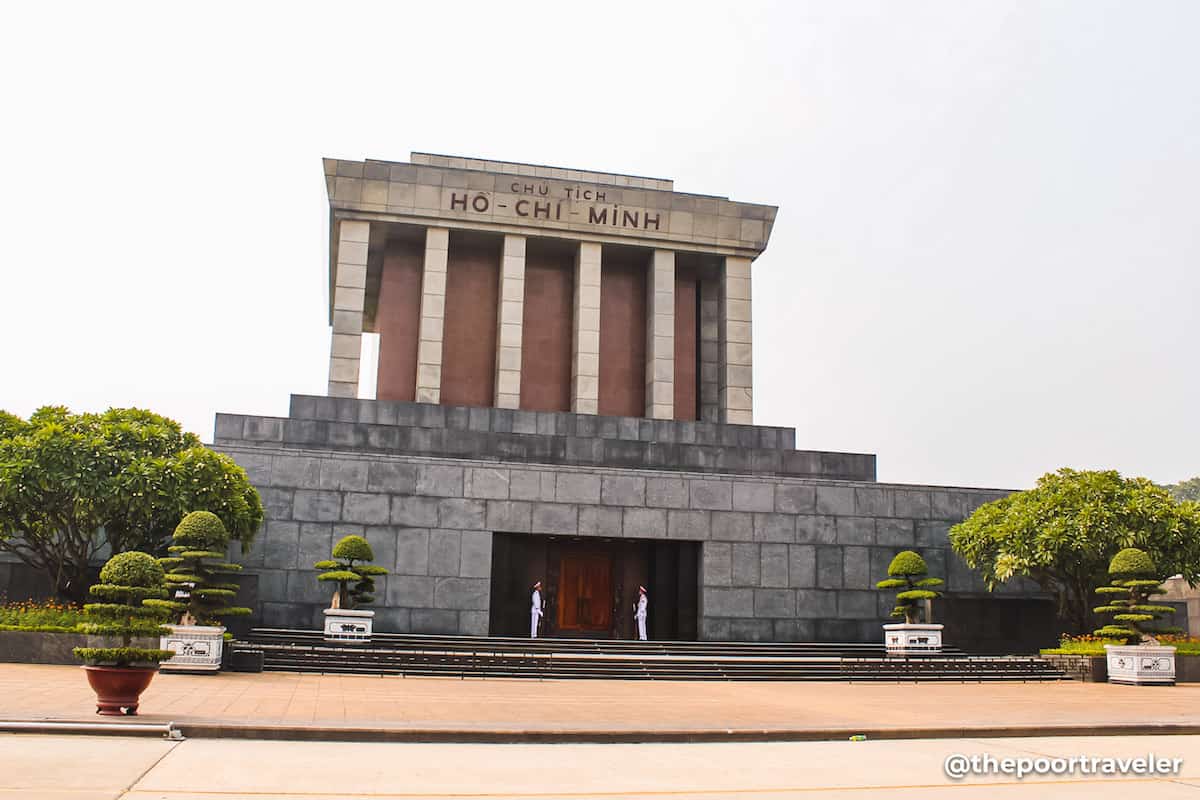
Other info you need to know:
- Language: Vietnamese. In writing, the Latin or Roman script is used with additional diacritics for tones. English is understood and spoken in most touristy places. Taxi and Grab drivers speak limited English, so it’s advisable to have the address of your destination written down to avoid confusion. Most street vendors speak or understand very little English or none at all.
- Currency: Vietnamese đồng (VND, ₫). VND 100,000 is around USD 4.27, EUR 3.76, SGD5.78, PHP 230 (as of August 2018). However, it is not uncommon for hotel and tour operators to use US dollars.
- Modes of payment: Cash is still king in Hanoi. Use your credit card sparingly. There are reports of hotels and shops stealing credit card information. If you must use your credit card, do so for reputable hotels.
- Safety: Being situated along the so-called Banana Pancake backpacking trail, Hanoi and Vietnam in general are used to tourists. But scams can give so much headache, especially if this is your entry point. Taxi drivers and vendors are known to overcharge foreigners. Sleight-of-hand and credit card scams are also not unheard of.
- Electricity Info: 220V, 50Hz. Most common sockets are sort of a combination of Types A and C. They have two holes that can accept both flat and round pins, the shape of two door knobs or rubber stamps facing each other. This type of socket can take plugs that are Types A, C, and F. If your plug has three pins, you will be needing an adaptor.
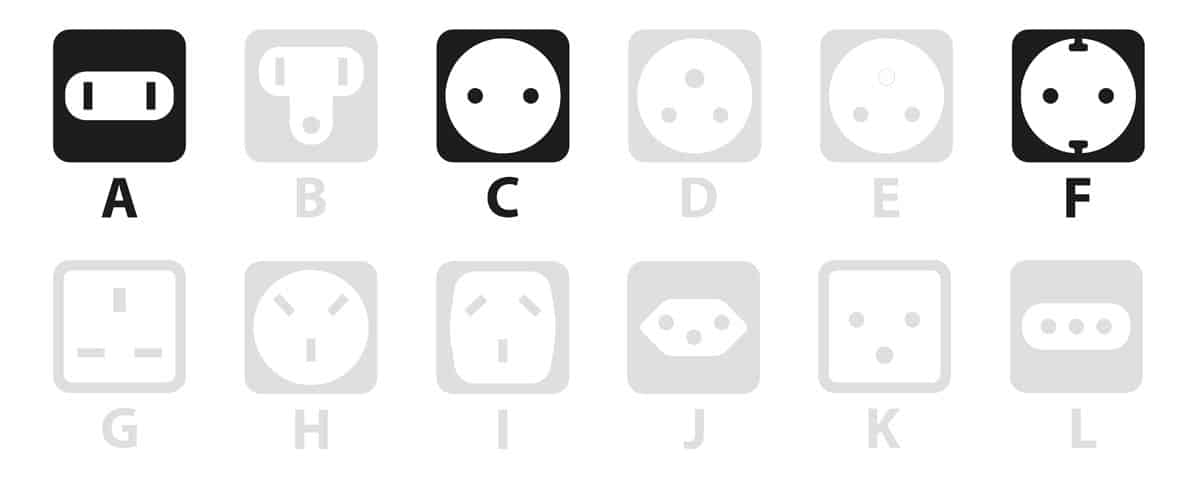
When is the Best Time to Visit Hanoi?
March to April (spring) and October to November (autumn). These are the months when the temperatures are most pleasant and precipitation is low.
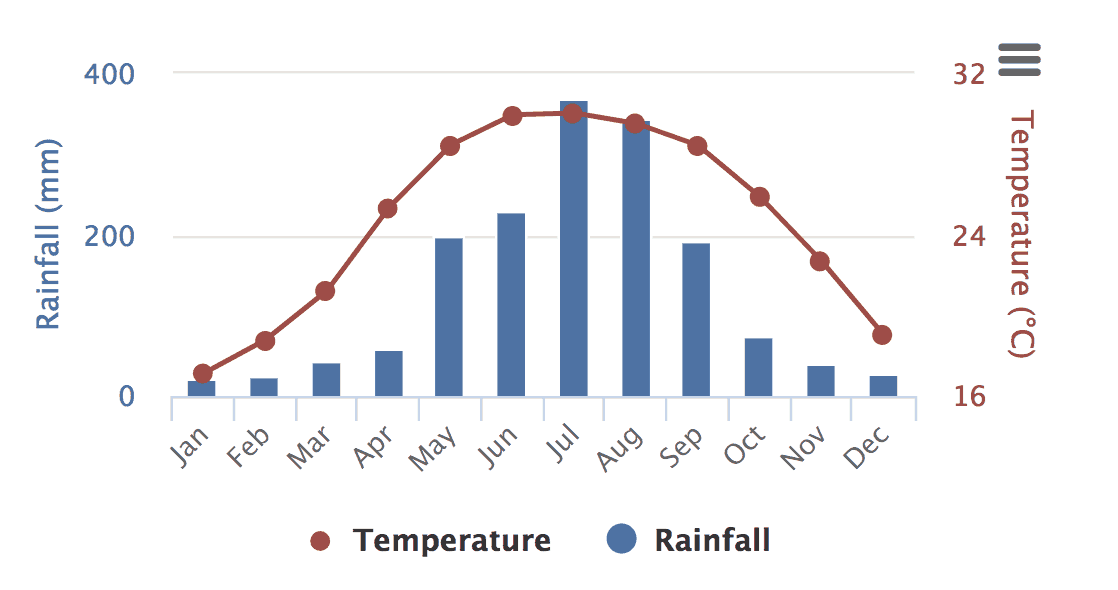
Hanoi experiences a warm humid subtropical climate with four distinct seasons. Summer is from May to August, autumn from September to November, winter from December to February, and spring from March to April.
If you can help it, the season you should avoid is summer. This is the hottest and wettest period of the year. Although the average temperature is just around 30C, the mercury can soar to as high as scalding 40 in July. Rainfall numbers also rise dramatically as soon as May kicks in and peaks in July.
Average temperature in winter (December to February) is only 18C, but it can get harsh. In 2016, the city recorded its lowest temperature in 40 years, plummeting to 5.4C. But it’s not a bad season for exploring and museum-hopping because walking around can easily warm you up. This period is also the driest so you don’t need to worry about rain showers most of the time.
How to Get to Hanoi
Situated at the heart of the northern half of Vietnam, Hanoi is pretty detached from other Southeast Asian capitals or large metropoles. It is 33 hours away from Ho Chi Minh City (Saigon) by train and 27 hours from Luang Prabang by bus. Unless you’re on a larger backpacking journey across Vietnam and stopping in other cities in between, it is best to fly.
Hanoi is served by Nội Bài International Airport (HAN), the country’s largest airport by capacity. It is more commonly referred to as Hanoi Airport. Located 35km north of the city, travel time is 45 minutes to an hour.
Manila to Hanoi
Cebu Pacific is the only airline that flies directly from the Philippines to Hanoi. If you book in advance, you can find fares for as low as P3500, one-way.
Scoot offers cheap flights too, but it involves a layover in Singapore.
Below is a quick Traveloka flight search.
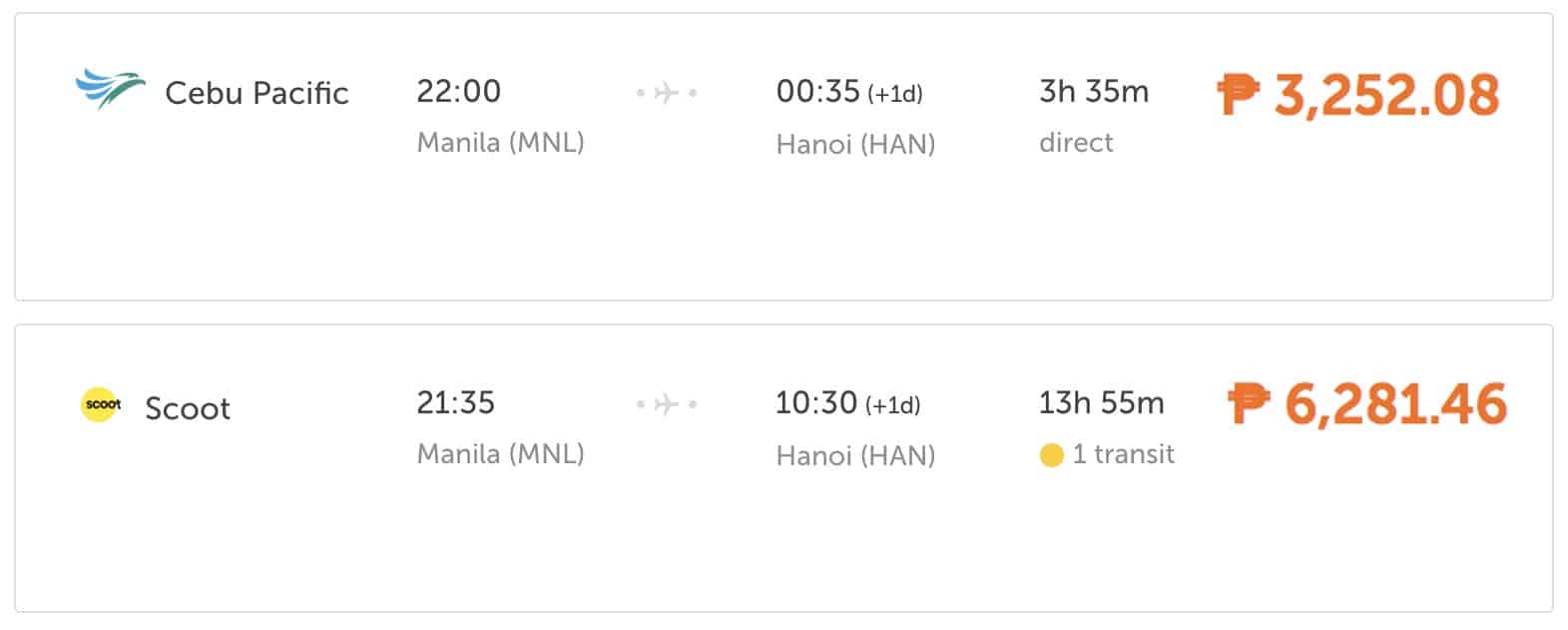
Ho Chi Minh City to Hanoi by Plane
You can reach Hanoi from Saigon in three ways: by bus, by train, and by plane. I’m not even gonna discuss the bus because it is slow and so uncomfortable, it’s almost impossible to rest onboard.
Flying, of course, is the easiest and fastest. Both VietJet Air and Vietnam Airlines offer multiple flights from Ho Chi Minh City to Hanoi. In general, VietJet Air’s late night flights are the cheapest at only 35USD one-way.
JetStar also carries passengers from Saigon to Hanoi for almost the same price but with a stop in Da Nang, extending the travel time to 4 hours 40 minutes.
Ho Chi Minh City to Hanoi by Train
Ho Chi Minh City and Hanoi are over 1720 km apart. Five Reunification Express trains ply this route. Travel time is 32 to 38 hours. Here’s the schedule:
- Train SE2. Departs 21:44, Arrives 05:30 (32h35)
- Train SE4. Departs 19:45, Arrives 04:50 (33h05)
- Train SE6. Departs 09:00, Arrives 19:58 (35h58)
- Train SE8. Departs 06:00, Arrives 15:33 (34h33)
The fares are dictated by the class. You may choose to book a seat or a berth, if you want to be comfortable. Here are the usual rates:
- Soft Seat: 907,000₫ (USD40, PHP2090)
- Hard Berth: 1,265,000₫ (USD55, PHP2911)
- Soft Berth: 1,423,000₫ (USD62, PHP3275)
If you book via travel agency, expect to be charged a bit more. To be safe, you can book via 12go, which is a Southeast Asian bus and train booking app. You can use the search box below or click here: HO CHI MINH TO HANOI TRAIN TICKETS.
Powered by 12Go Asia system
Hanoi Airport to City Center
Many tourists are ripped off within an hour of arrival in Hanoi because scams are rampant at the airport. The key is to not be gullible. Know how much you should be paying, insist on paying no more than that amount, and decline any suggestion of stopping anywhere other than your destination. Scammy drivers often take advantage of a tourist’s cluelessness, flight exhaustion, and unwillingness to assert themselves.
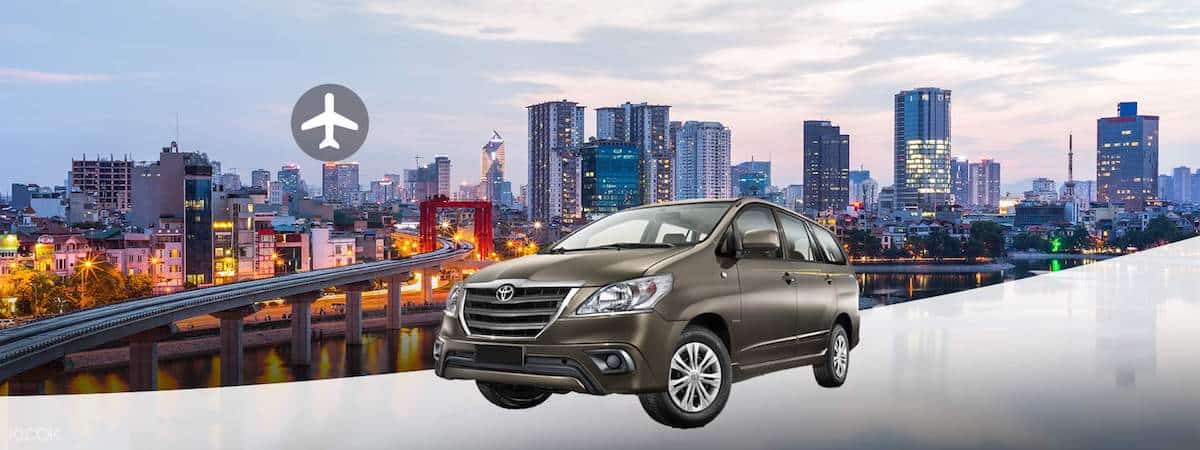
Consider booking an airport transfer via Klook. This is a private car service, but is still cheaper than the taxi. It costs only 337,843₫ (14.5USD, 773PHP) inclusive of driver fees, airport parking fees, and toll fees. The rate is per vehicle, NOT per person, so this is great if you’re a group.
If your hotel is located in Hai Ba Trung, Tay Ho, Ba Dinh, Cau Giay, or Dong Da district, a 50,000₫ surcharge will be collected by the driver.
✅ RESERVE A CAR NOW
If there are no more cars available or you just want to take public transportation, here are your options to get to the Old Quarter.
- By taxi. As soon as you exit the terminal, you’ll be approached by taxi drivers offering their services. Ignore them. They are usually the ones who overcharge their passengers. Instead, go straight to the designated taxi ranks and charter one from there. Make sure you agree to the driver that you’re paying the government-imposed fare, which is around 380,000₫. It already covers toll fees so don’t add any more to it. Anything more means you’re being ripped off.
- By Bus #86. Runs from the airport to the city center every 30 minutes or so from 6:30am to 11:30pm. If your hotel is in the Old Quarter, you can get off at the bus stop in front of the Post Office near Hoan Kiem Lake. Travel time: 1 hour. Fare: 35,000₫.
- By Bus #17. This is a public bus that operates from the domestic terminal directly to the Long Bien Bus Terminal in the Old Quarter from 5am to 10pm. From international terminal, you’ll have to walk a bit to the domestic building. Fare: 9000₫.
- By shuttle bus. These are offered by airlines like Jetstar and Vietnam Airlines, but I don’t have much information about them. The reviews are terrible too. Fare: 40,000₫.
You can also ask your hotel contact for airport pick up. Just coordinate with your hotel before your flight.
Whether you take the taxi or minibus, beware of scams. Some taxis are known to take passengers to another hotel, whom they have a long-term arrangement with.
Another option is to use the Grab app. (Uber has stopped operating in Vietnam this year.) Grab fare should also be around 300,000₫ from the airport to Old Quarter.
Pocket Wifi Rental in Hanoi
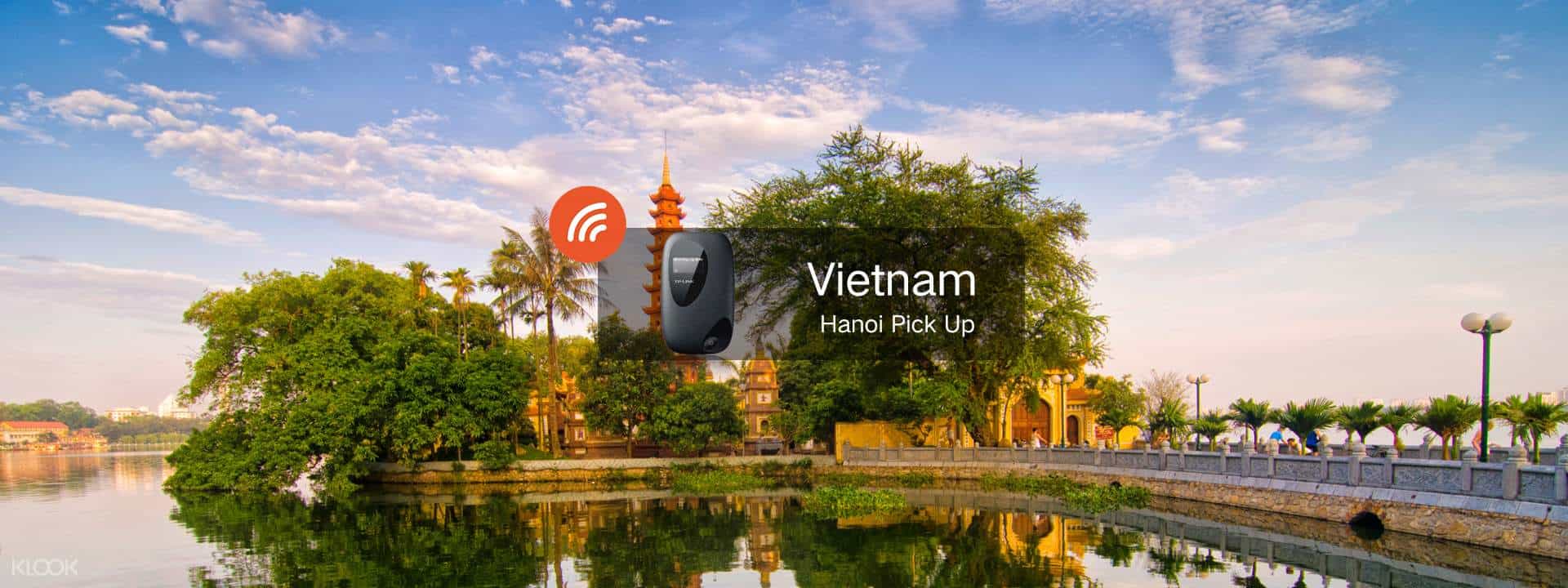
Because of the language barrier, it’s a good idea to stay connected should you feel the need to consult the gods of the Internet for research or recommendations. Klook offers mobile wifi devices for rent, delivered to your hotel so you don’t need to worry about picking it up.
The device will be delivered to your hotel on the day you choose so just ask the front desk if there is a pocket wifi for you upon check in. You can connect up to 8 devices at once.
Only limited number of devices are available, so reserve one as soon as you can.
✅ RESERVE A POCKET WIFI HERE
Things to Do in Hanoi
Hanoi City Tour

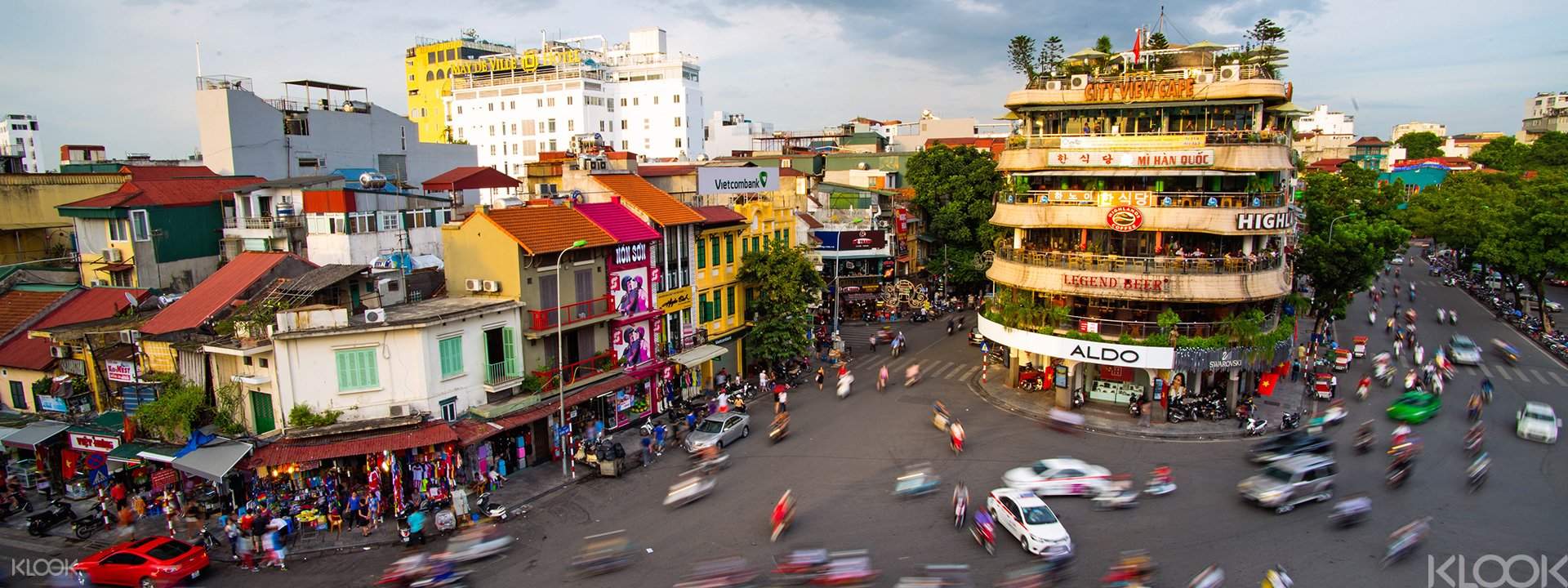
There’s a lot to see and learn in Hanoi. Anyone who tells you that it’s a boring city either has not set foot in it or was probably not paying attention during their visit. As you know, Vietnam’s ancient and modern history is action-packed, to put it casually. It is compelling and there are a lot of stories especially from its more recent wars that need to be heard. These stories are written all around the city; you just need someone to point it out to you. Yes, you can totally do it on your own but having a guide is always recommended because they can provide not just information but also insight.
Klook offers four different tours. Here are the links:
- Full Day Tour. Group Tour. Duration: 07:30am to 4:15pm (around 7 hours). Stops: Ho Chi Minh Mausoleum, One-Pillar Pagoda, Lacquer Paintings workshop, Tran Quoc pagoda, Temple of Literature, Ngoc son Temple, among others. Check Rates or Reserve a Slot Here
.
- Morning Tour. Group Tour. Duration: 8am to 12nn (4 hours). Stops: Ho Chi Minh Mausoleum, Presidential Palace, One-pillar Pagoda, Temple of Literature, Porte D’Annam Restaurant. Check Rates or Reserve Here
.
- Afternoon Tour. Group Tour. Duration: 1pm to 5pm (4 hours). Stop: Old Quarter, Ancient Citadel, Cua Bac Church, Quan Thanh Temple, West Lake, Pho Cuon Restaurant, Chau Long Market, Hang Than Street, and Dong Xuan Market. Check Rates or Reserve Here
.
- Private Full Day Tour. Duration: 8am to 5pm (9 hours). Stops: Ho Chi Minh Mausoleum, Imperial Citadel, Temple of Literature, Long Bien Bridge, Cyclo tour around Old Quarter, ice cream shop, among others. Check Rates or Reserve Here
.
Hanoi Food Tour

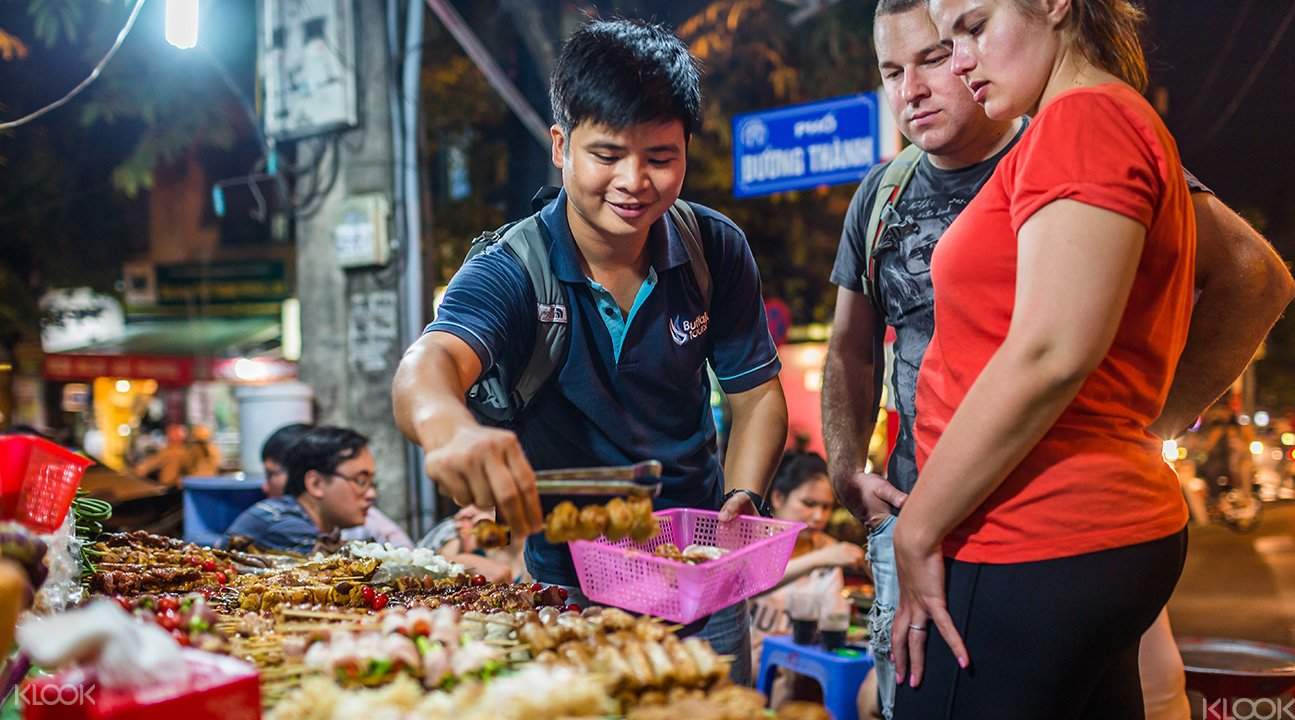
One of the city’s best assets is its cuisine. By joining a food tour, you get to raid the markets and backstreets of Hanoi’s Old Quarter district to sample traditional dishes, street food, and local desserts! You also get to down a local beer if you join the evening tour.
You can book below:
Traditional Vietnamese Cooking Class

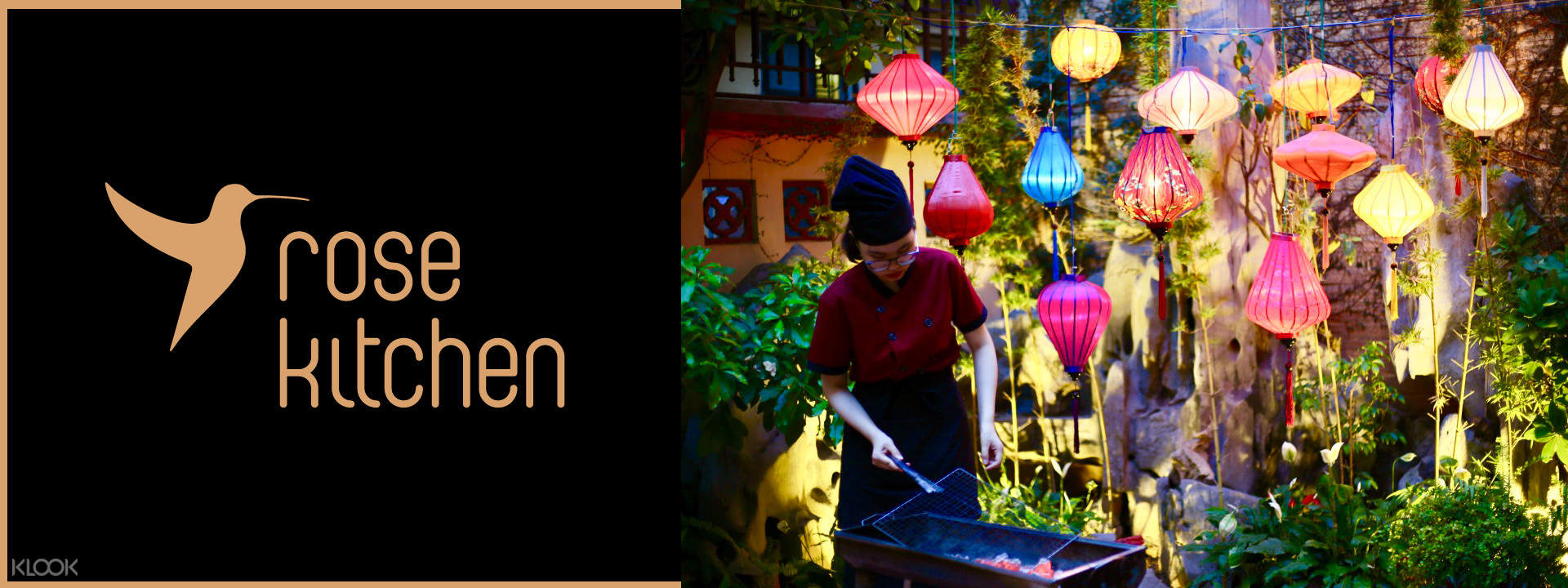
If you want a more immersive take on the Vietnamese culinary tradition, you can join a cooking class instead. One of the more popular classes is offered by Rose Kitchen, with 96% Excellent ratings on TripAdvisor. This 4.5-hour session begins at a visit to a local market where you will shop for ingredients. Then you will head to the kitchen to prepare dishes like bún chả (barbeque pork with noodles and fish sauce), fried spring rolls, Vietnamese egg coffee, and a choice between banana flowers salad with chicken and green papaya salad with beef. The menu may change, depending on availability of ingredients and other factors. You can also request for a vegetarian menu.
✅ CHECK RATES or RESERVE A SLOT HERE
Perfume Pagoda Day Tour

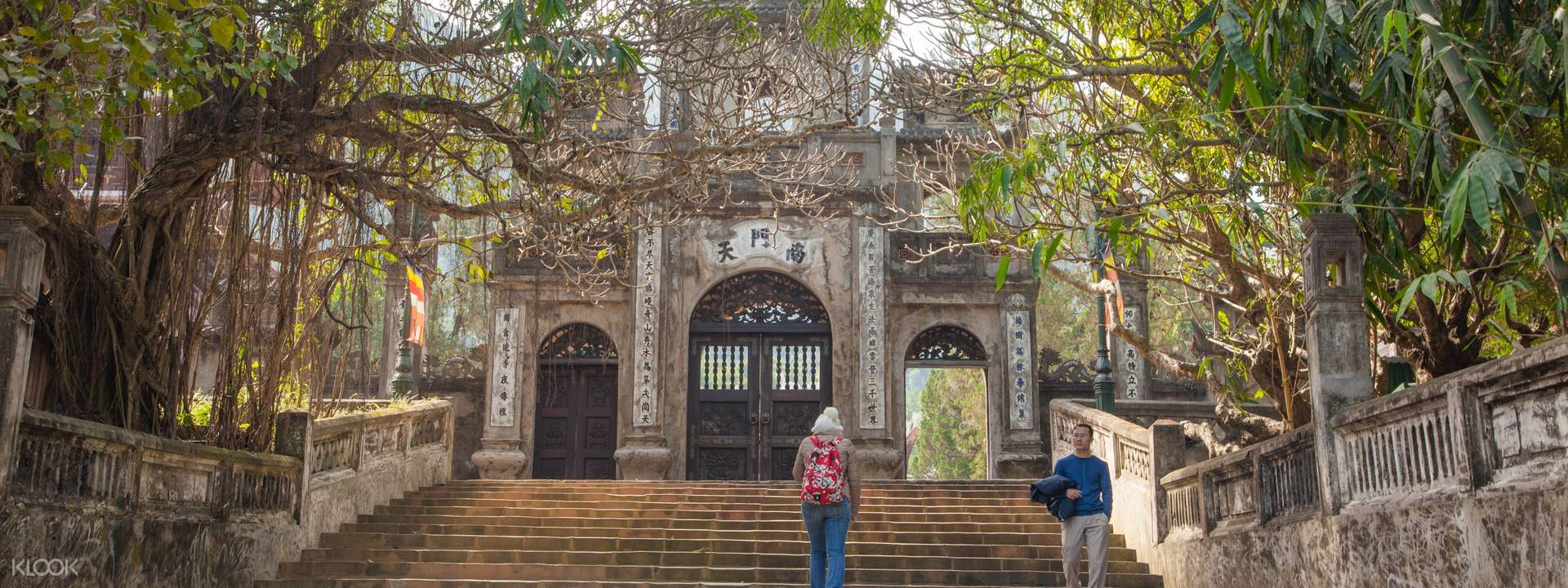
The Huong Pagoda or Perfume Pagoda is a complex of Buddhist shrines and temples in the karst Huong Tich mountains in Hanoi’s Mỹ Đức District. The site attracts hundreds of thousands of pilgrims during the Huong pagoda Festival, which usually begins on February 15.
Taking Klook’s day tour will allow you not just to visit the temples but also ride a rowboat down the Yen Stream and enter the Hong Tich cave which features several rock formations.
✅ CHECK RATES or RESERVE A SLOT HERE
Lang Toi Show (My Village Show)
ShowTicket.jpg%22)
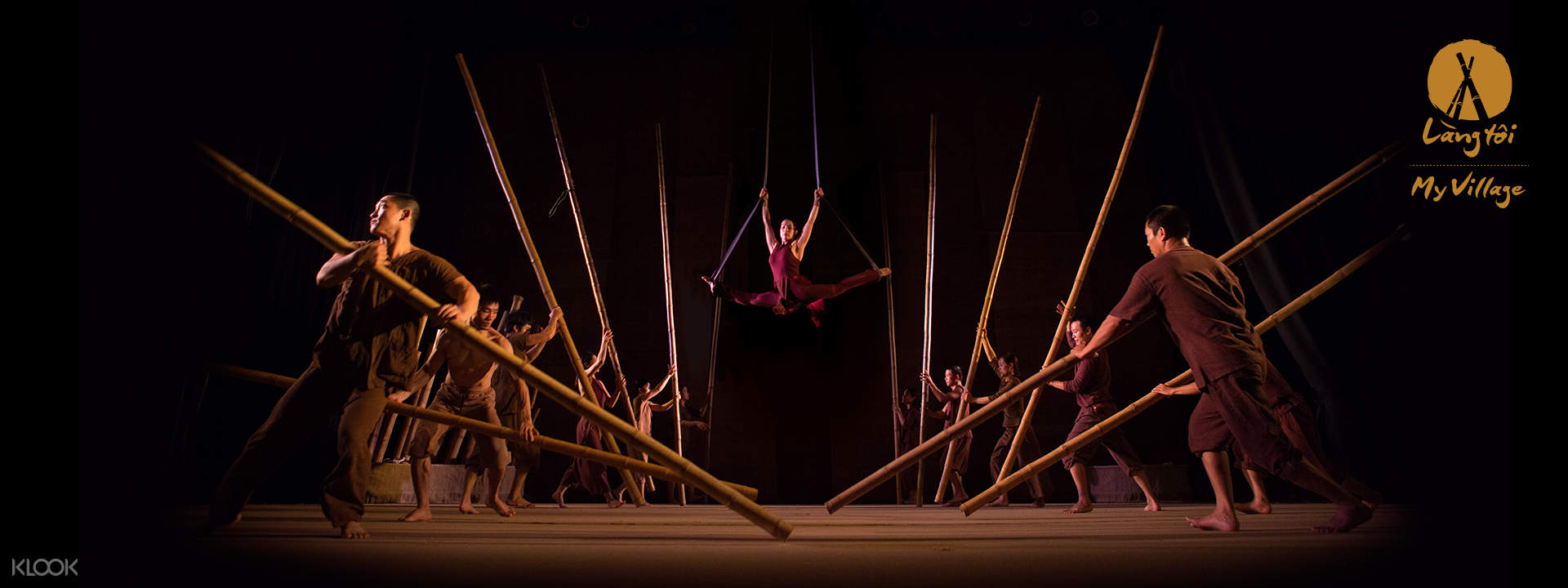ShowTicket.jpg)
This spectacular hour-long performance showcases the life in the countryside of Northern Vietnam through rhythmic dance, awe-inspiring acrobatics, and bamboo stunts. It also features Vietnamese folk music produced by 20 musical instruments.
The venue is either the Hanoi Vietnam Tuong Theater or the Hanoi Opera House, which is one of the most iconic structures in the city.
✅ RESERVE SHOW TICKETS HERE
Thang Long Water Puppet Show

Known locally as mua roi nuoc, water puppetry was performed at the end of harvest season and in religious ceremonies. The Thang Long Water Puppet Theater showcases the art of water puppetry in their nightly shows. Through these performances, they introduce many aspects of the Vietnamese culture and subcultures. It’s like Vietnam Culture 101 done in a wet and wooden fashion.
Admission Ticket: 60,000₫ or 100,000₫. You can buy at the entrance.
Places to Visit in Hanoi
As mentioned, it is completely possible to pull a DIY. We still recommend having a guide, but if your budget rules that out, you can just explore the city on your own. Many of the historic attractions collect little to no entrance fee, which is great news for shoestring travelers.
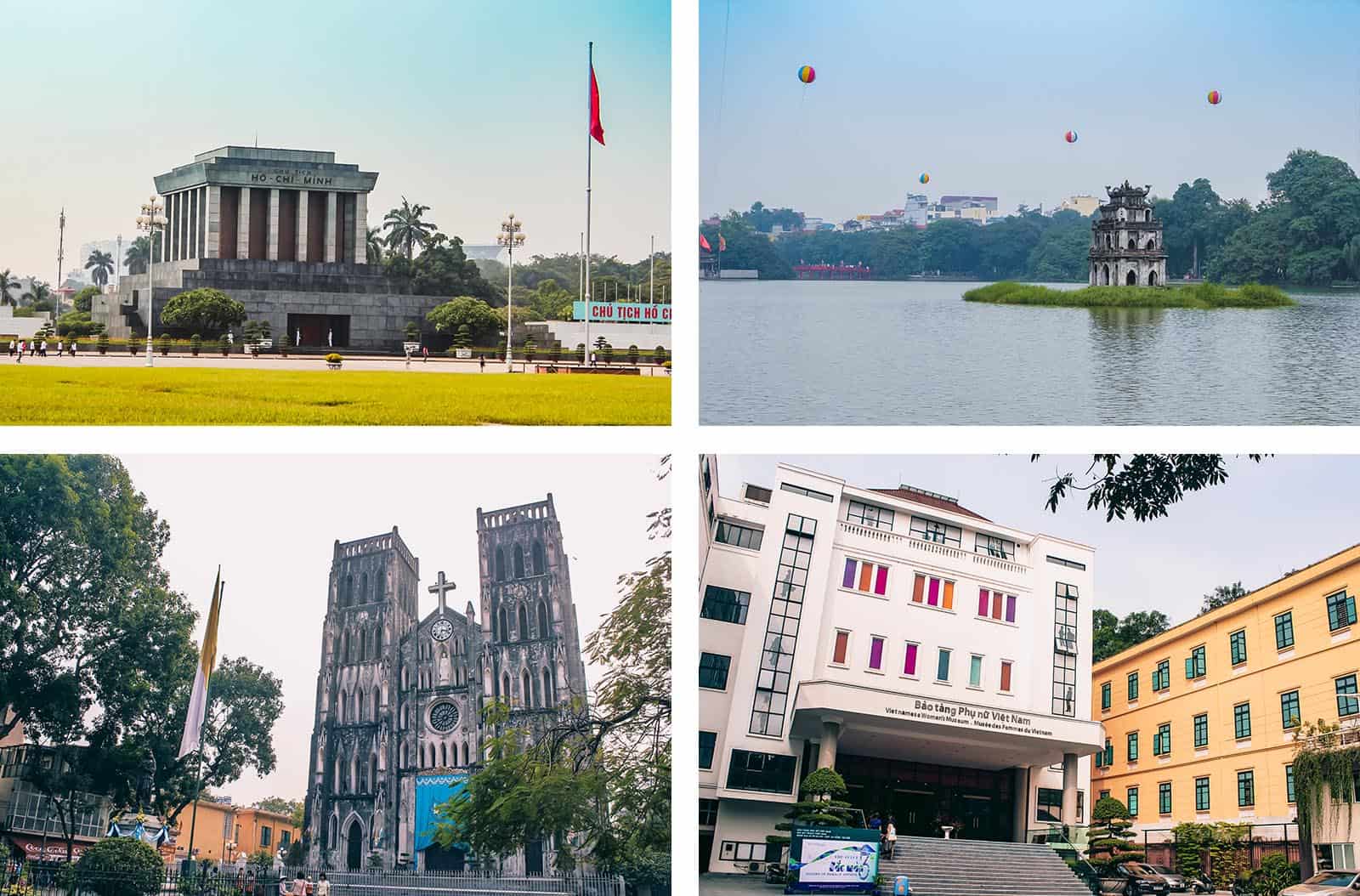
Here are some of the places worth checking out.
- Hoan Kiem Lake, the heart of the city surrounded by historic structures and dotted with two islets, the three-tiered Turtle Tower and the four-gated Ngoc Son Temple. Ngoc Son Temple is open: 8am-5pm. Entrance Fee: 30,000₫.
- Ho Chi Minh Mausoleum, which houses the body of Uncle Ho, widely regarded as the Father of modern Vietnam. Open: Daily, 8am-11am (11:30am on weekends). Entrance Fee: FREE.
- Ho Chi Minh Museum, which displays the history of Vietnam, with a strong focus on the country’s struggles against the French and the US-backed South Vietnam. Opening Hours: 8am to 12pm daily, 2pm-4:30pm, Tuesday-Thursday, Saturday-Sunday. Entrance Fee: 40,000₫.
- Vietnamese Women’s Museum, showcasing more than 25,000 pieces of documents and objects that present the role of women in culture, society, politics, and nation building in Vietnam. Opening Hours: Daily, 8am-5pm. Entrance Fee: 30,000₫.
- Hanoi Opera House, an architectural landmark boasting intricate French colonial style.
- West Lake, also surrounded by historic structures including Tran Quoc Pagoda, the oldest in the country, and Quan Thanh Temple, one of ancient Hanoi’s four sacred temples.
- St. Joseph’s Cathedral, the oldest church in Hanoi, built by the French colonists in 1886 on the site of the Bao Thien Pagoda.
IMPORTANT! Please note that inside the Mausoleum, you must observe proper dress code. Mini-skirts, sleeveless shirts, and short shorts are prohibited. Photography and filming are not allowed either. Your phones and cameras will be collected by the entrance guards.
More information about these sites and more here: FREE & CHEAP THINGS TO DO IN HANOI.
Northern Vietnam Tours from Hanoi
Hanoi is also a jump off point to other amazing destinations in Northern Vietnam like Ha Long Bay, Ninh Binh, Sapa, and Mai Chau. Here are your options from Klook.
Ha Long Bay Tour from Hanoi


Halong Bay is easily accessible from Hanoi. Almost every hotel works with a travel agency that can take their guests on a tour of the bay. The price range is wide. You’ll find one that costs as low as 35USD and as high as 300USD. So what gives?
Three things usually dictate the price of tours: the duration, the itinerary and the boat. Itinerary because some tours have more stops and cover a larger part of the bay. Some will take you farther to Lan Ha Bay or Cat Ba Island. The boat, because not all boats are created equal. The newer ones charge more. Those tagged “deluxe,” although usually just a marketing thing, provide a noticeably better service.
Duration, because some will take you on a 2-day/1-night or 3-day/2-night cruise, some will take you only on a day tour. If you can, spend at least a night in Ha Long Bay so you get to see more. But if you can only spare a day, thats fine too. A day tour will treat you to lunch on the boat and take you to the most popular spots, often including a Thien Cung Cave visit and a kayaking session.
Here are the Ha Long Bay tours on Klook.
- Day Tour. Traditional junk boat. Check Rates or Reserve Here
- Overnight Tour (2D1N). Stops: Ha Long Bay (Caves, kayaking) and Lan Ha Bay. Check Rates or Reserve Here
- 3D2N Tour. One night aboard traditional junk boat, one night in a hotel on land. Stops: Ha Long Bay (Sung Sot Cave, Soi Sim Island or Titop Island, Pearl Farm), Lan Ha Bay, Viet Hai Village, Cat Ba National Park, Cat Ba Town. Check Rates or Reserve Here
- Best-seller: Deluxe Cruise. You can choose day tour, overnight, or 3D2N. The boat they use is relatively new, compared to other boats in Ha Long Bay. This one also has great reviews. Check Rates or Reserve Here
Sa Pa Tours from Hanoi


Sa Pa to Vietnam is what Benguet is to the Philippines. It’s a small rustic town in the highlands of Hoàng Liên Son, famous for its scenic, fog-covered mountains, incredible rice terraces, and hill tribes like the Hmong, the Dao, and the Tay. Trekking is the most popular activity here among tourists. A usual destination is Phang Xi Pang peak, which stands at 3143m.
If you have a flexible schedule, the best way to reach it is by overnight train + van/bus. Sapa doesn’t have its own train station, so you’ll need to alight in Lao Cai Station. Travel time is around 8 hours. But because you’ll be burning all that time sleeping on the train, you actually won’t waste any minute. If anything, you’ll get to save a hotel night.
Train fares:
- Berth (so you can sleep comfortably): 415,000₫ (18 USD, 956 PHP)
- Soft seat: 155,000₫ (7 USD, 357 PHP)
From Lao Cai Station, you can take the van (Fare: 40,000₫) or the public bus (Fare: 30,000₫) to Sa Pa Station.
If you don’t want to deal with the planning or navigating, you can also take a tour from Hanoi. Klook offers a 2D1N tour. They will pick you up in Hanoi, tour you around Sapa, allow you to stay overnight there, and drop you off back in the capital after the tour. It will be using a bus, which reduces the travel time to only 6 hours.
The price of the tour varies depending on where you choose to spend the night. Options are usually a homestay or a hotel in Sin Chai, Ta Van, Cat Cat or Ham Rong.
✅ CHECK RATES or RESERVE A SLOT HERE
Ninh Binh Day Tour from Hanoi


Ninh Binh is another rising destination not too far from Hanoi. In fact, you can visit this on a day tour from the capital. Located in the Red River Delta, Ninh Binh captivates with its scenic areas, cave networks, ancient temples, and towering cliffs rising above rivers and rice fields.
Klook has a variety of Ninh Binh day tours from Hanoi, but these two are the most popular.
Where to Stay in Hanoi
Hanoi’s historic core is divided into four districts: Hoàn Kiếm, Ba Đình, Hai Bà Trưng, and Đống Đa. Which of these four is the best place to stay? Hands down, Hoàn Kiếm.
Hoàn Kiếm’s map is dotted with postcard-worthy French colonial structures on the southern side and occupied by the Old Quarter in the north. The Old Town is the beating heart of Hanoi’s backpacking culture. It is where most cheap hotels and hostels, restaurants, and tour operators are located. Most attractions including the lake and the Ho Chi Minh complex are all within walking distance. Buses, both from the airport and other Vietnamese cities, pick up and drop off passengers here. And most tours start and end in this pretty little corner. Without question, this is the best and most convenient place to stay for budget travelers.
Most Old Quarter hotel rates usually range from 1 million dong (43 USD, 2300 PHP) to 1.6 million dong (70 USD, 3700 PHP).
Do you need advance reservation? Yes. If you can, do so. You don’t want what happened to us happen to you too. We arrived in Hanoi without any hotel reservation so we had to scour through the streets in the middle of the night with heavy backpacks. It took us almost an hour before we found one, and I didn’t even like our hotel. Haha. So I’m not blogging about where I stayed.
Top Hanoi Hotels
If you’re looking for budget hotels, here are the top properties in Hanoi’s Old Quarter as scored and ranked by Agoda users.
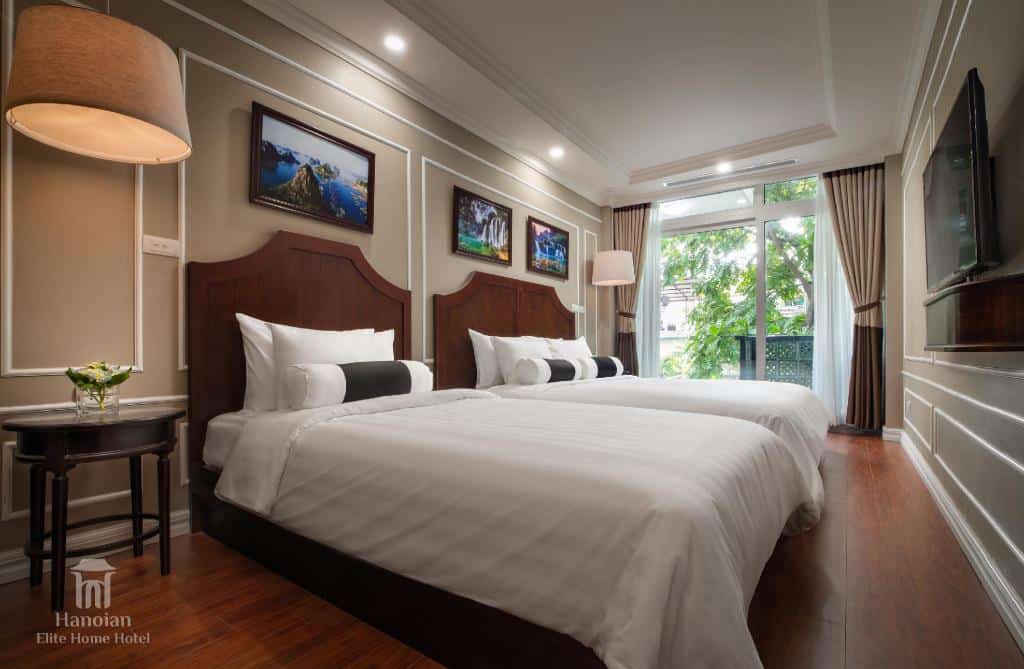
Search for more Hotels
Sample Hanoi Itinerary
Here’s a sample 3-day/3-night Hanoi itinerary. Please take note that this itinerary assumes the following:
- You’re a party of two, splitting accommodation and some transportation costs.
- You’re arriving in and leaving Hanoi past midnight. Make sure you communicate your check-in time with your hotel.
- You’ll be taking an overnight tour of Ha Long Bay. On the night that you’re gone, you can leave your bags in your hotel in Hanoi temporarily and just pick them up before your flight.
- Your accommodations budget is ₫1,000,000 per night. You can find properties much lower than this, but let’s just set it at 1 million for budgeting purposes. You’re splitting the cost with your companion, so that’s only ₫500,000 per head.
- Your budget per meal is ₫100,000. That’s actually way too much. You can find a good bowl of pho for as low as ₫30,000 or a sandwich for ₫25,000. What I usually do is, if I don’t spend much on lunch, I’m going to splurge a little for dinner. For example, if I spend only ₫40,000 for lunch, I’ll add the supposed ₫60,000 savings to my dinner budget, which gives me ₫160,000 that night. This rule keeps my spending in check while still being able to do most of the dishes I want.
- You’re skipping breakfast. It’s healthy (according to intermittent fasting advocates, hehe)!
Feel free to make necessary adjustments to this itinerary to match your flight schedule, personal tastes, and whatnot.
Day 0: ARRIVAL
12:35am – Arrival at Hanoi Airport
01:30am – Transfer to city center, ₫169,000 (338K/2pax), Reserve here
02:30am – Hotel check-in
03:00am – Rest
Day 1: FOOD TOUR + HO CHI MINH COMPLEX
08:00am – Wake up, walk to Ho Chi Minh Mausoleum
10:00am – Ho Chi Minh Mausoleum, FREE
11:00am – One-pillar Pagoda, FREE
11:30am – Lunch, ₫100,000
02:00pm – Ho Chi Minh Museum, ₫40,000
04:30pm – Walk back to Old Quarter
06:00pm – Food Tour, ₫400,000, Book here
09:00pm – Walk back to hotel
10:00pm – Lights out
Day 2: HANOI LAKES
07:00am – Wake up
08:00am – Huc Bridge & Ngoc Son Temple, ₫30,000
09:30am – St. Joseph Cathedral, Vietnamese Women’s Museum, ₫30,000
11:00am – Lunch, ₫100,000
12:30am – Walk to Thang Long Opera Hotel
01:00pm – Hanoi City Tour, ₫653,000, Reserve Here
05:00pm – End tour
07:00pm – Dinner, ₫100,000
09:00pm – Walk back to hotel
10:00pm – Lights out
Day 3: HA LONG BAY DAY TOUR
07:00am – Early hotel check-out, leave bags
08:00am – Start Halong Bay Tour, ₫1,080,000, Reserve Here
08:30pm – Back to hotel, pick up bags
09:00pm – Transfer to airport, ₫117,000 (₫233/2pax), Reserve here
10:00pm – Flight check-in
01:00am – Flight out
The itinerary above will set you back around 3 million dong (USD 130, EUR 114, SGD 178, PHP 6900), excluding airfare and hotel.
If you spend 500,000₫ per night on accommodations (1 million divided by 2 pax), the itinerary above will cost you 4.5 million dong (USD 194, EUR 170, SGD 266, PHP 10,335), excluding airfare.
If you’re coming from Manila and you’re able to snag a P6500 promo flight fare, prepare to shell out P18,500 including travel tax.
Again, this is a pretty bloated budget, but it’s better to overestimate than under. (Don’t be like me! I ran out of cash, haha.) There are many ways to reduce the total cost. You can find rooms that are much lower than the 1 million budget. The 100,000 per meal budget is also too big because food in Hanoi is unbelievably cheap; half of that can already fill you.
For more sample itineraries for 1 day, 2 days, 3 days, 4 days, 5 days, 6 days and 7 days, visit: HANOI ITINERARIES.
Hanoi Travel Tips for the Poor Traveler
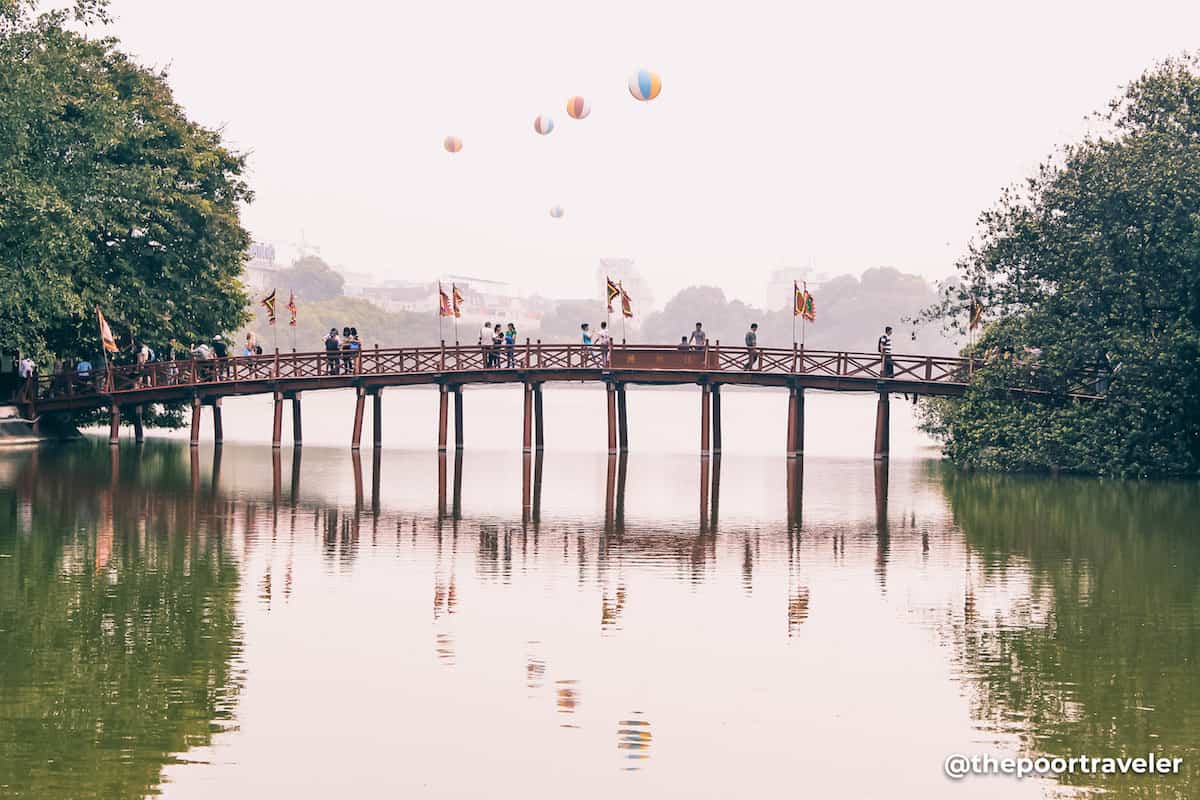
- Walk when you can. Most of the attractions in Hanoi stand not too far from Old Quarter and from each other. If you have the energy and the weather is pleasant, use those legs.
- Be friendly but cautious. My friends told me that locals are unfriendly, but it wasn’t the case when I visited. But it can be difficult to figure out which ones are genuinely friendly and which ones are after your money. Around Hoan Kiem Lake, you might be approached by locals who are interested to practice their English with those who speak it well. This happened to me many times, and I find it a delightful and rewarding experience each time. You get insights from locals and you help them as well. But there are scammers too, who would try to tour you around or take you to seedy places. Rule of thumb is, if a local starts engaging you in a conversation, that’s okay as long as you stay put. Don’t go anywhere with them.
- Being a millionaire is hard. Vietnamese dong banknotes can be confusing if you’re not that familiar with them. They all feature Uncle Ho, and all those zeroes are dizzying. If you get confused, take your time. Don’t let a stranger count your money or pull a bill from your wallet. Sleight-of-hand scams are not uncommon. They’re fast. They can take a note even when they’re counting it in front of you. Double check when paying.
- Be careful when crossing the street. In Hanoi, every day is a battle with the countless scooters. They are fast, reckless, and oblivious to the crossing pedestrians. Throughout my stay, I have seen several accidents. Just look to your left and right before crossing, and when you do, commit to it. Cross slowly, but don’t stop or hesitate in the middle because drivers expect you to keep on walking.
Frequently Asked Questions
Is Hanoi safe?
It is safe, generally. My only pet peeve about Hanoi is locals overcharging tourists. It’s not just limited to taxi drivers. Some street vendors try to take advantage of your not being familiar with the prices to get more money from you. Of course, it happens almost everywhere else in Southeast Asia, but it’s just glaring in Hanoi and Saigon.
Remember, I was traveling with Josephine, a French friend who is obviously a foreigner because she’s white and blonde. But we were not together all the time. Prices seemed to be significantly lower whenever I wasn’t with her. For example, there was this street snack that we both liked. It’s basically corn with shrimp paste. I was with Jo the first time I tried it. When we asked how much it was, the vendor said it was 70,000₫. We thought it was expensive but because it was our first night and we were extremely tired and hungry, we didn’t think much of it. The next evening, I returned. I’m Southeast Asian too and can easily pass as a local. This time, I didn’t say anything. I just pointed and handed money. When they gave me change, I realized that the corn was only ₫20,000.
It’s things like this that leaves a bad taste. It doesn’t feel good to be constantly wondering whether or not you’re being overcharged for something. Again, it’s not exclusive to Hanoi. Heck, this sort of thing happens a lot in the Philippines too, usually with taxi drivers. But not as rampant as in Hanoi.
That said, don’t be discouraged to visit. Hanoi is a beautiful city that is rich in history. There is a lot to see and discover. Just be cautious, especially if you’re traveling with very limited funds.
What is the tipping policy in Hanoi?
In general, tipping is not mandatory in Vietnam. In small restaurants, locals don’t tip. But tipping is starting to be practiced in touristy areas. If you enjoyed the food, a dollar is well appreciated by waiters.
More upscale restaurants add a 10% service charge to the bill, but often it doesn’t go to the staff. If you want to reward a particular member of the staff for exceptional service, hand it to them directly.
Hotel staff like bellboys and cleaners are rarely tipped, but you can still show your appreciation with a dollar. Tour guides, however, are often expected to be tipped, especially if it’s a private tour. If the tour went for days, a 10-dollar tip is appreciated. Lower if it’s just a day tour.
Where to exchange money in Hanoi?
Some hotels and guesthouses offer currency exchange services but the rates are bad. Jewelry or gold shops offer the best rates without additional fees, but I’m not sure if these are legal, haha, so don’t exchange here either.
The bank remains the best place to exchange money, although a small processing fee might be added. The rates from bank to bank vary but not greatly enough to matter, unless you’re exchanging huge amounts.
If you’re carrying currencies like the Philippine peso, it will be hard to find good rates at shops. Instead, withdraw at ATMs. You’ll find a lot throughout the city, especially around Hoàn Kiếm Lake. Most have a withdrawal limit of 2 to 3 million dong per transaction.
What is the power socket used in Hanoi?
Most common sockets are sort of a combination of Types A and C. They have two holes that can accept both flat and round pins, the shape of two door knobs or rubber stamps facing each other. This type of socket can take plugs that are Types A, C, and F. If your plug has three pins, you will be needing an adaptor.
Do I need a visa to Visit Vietnam?
If you’re a Philippine passport holder staying for 21 days or shorter, no need for a visa. Just show up at the airport with a valid passport, return or onward ticket, and hotel reservation, and you’re good.
2️⃣0️⃣1️⃣8️⃣ • 8️⃣ • 2️⃣0️⃣
More Tips on YouTube ⬇️⬇️⬇️















![Toni Kroos là ai? [ sự thật về tiểu sử đầy đủ Toni Kroos ]](https://evbn.org/wp-content/uploads/New-Project-6635-1671934592.jpg)


